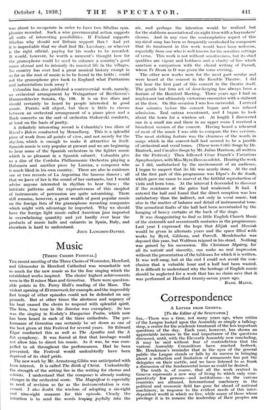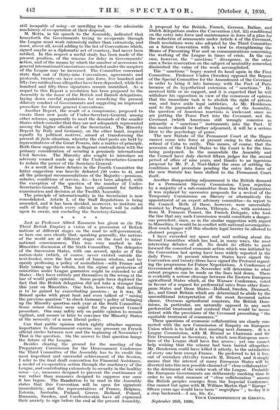Correspondence
A LEIS-ER FROM GENEVA.
[To the Editor of the Sexc-rwron.] SIR,—There was a time, not many years ago, when critics of the League looked upon the Assembly as simply a talking. shop, a centre for the academic treatment of the less important questions of the day. Each year, however, has shown an appreciable increase in the real importance of the questions discussed, until, with the Eleventh Assembly now concluding, it may be said without fear of contradiction that the various Assembly Committees have reached bedrock. Mr. Henderson's reminder that in the eyes of the general public the League stands or falls by its success in bringing about a reduction and limitation of armaments has put the delegates on their mettle, and we have listened to as frank a discussion of the fundamental issues as could be desired.
The truth is, of course, that all the work centred in Geneva represents a new way of living to which only com- paratively few persons—and institutions—in the various countries are attuned. International machinery in the political and economic field has gone far ahead of national machinery, in response to the evident needs of this inter- dependent world in which we live, while many of those whose privilege it is to assume the leadership of their peoples are still incapable of using—or unwilling to use—the admirable machinery of co-operation at their disposal.
M. Motto, in his speech to the Assembly, indicated that henceforth the Governments trying to co-operate through the League must work intensively rather than extensively, and must, above all, avoid adding to the list of Conventions which, signed maybe as a diplomatic act of courtesy, had never been ratified. In this respect a useful study has been made of the present position, of the reasons fur delay in Governments' action, and of the means by which the number of accessions to general international Conventions concluded under the auspices of the League may be increased. The Committee concerned state that out of thirty-nine Conventions, agreements and protocols, twenty-six have come into force, five hundred and fifty-two ratifications altogether have been deposited, while five hundred and fifty-three signatures remain unratified. As a sequel to this Report a resolution has been proposed to the Assembly in the name of the British and Danish delegations, laying down careful regulations for remedying the present dilatory conduct of Governments and suggesting an improved procedure for future general Conventions. Another Report, the result of a compromise, proposed to create three new posts of Under-Secretary-General, among other reforms, apparently to meet the demands of the smaller States which consider that they are not adequately represented among the higher officials of the Secretariat. The Minority Report by Italy and Germany, on the other hand, inspired equally by political motives, aimed at transforming the present de facto situation, whereby the chief posts are held by representatives of the Great Powers, into a matter of principle. Both these suggestions were in flagrant contradiction with the primary consideration of securing a genuinely international Civil Service. The Minority also sought to introduce an advisory council made up of the Under-Secretaries-General to reduce the power of the Secretary-General.
As a result of fierce debates in the Fourth Committee the latter suggestion was heavily defeated (30 votes to 4), and all the principal recommendations of the Majority—pensions, salaries, conditions of service, &c.—have been adopted, with the exception of the question of the number of Under- Secretaries-General. This has been adjourned for further examination and decision at the Twelfth Assembly.
The principle of internationality in the Secretariat is now consolidated. Article I. of the Staff Regulations is being amended, and it has been decided, moreover, to institute an oath of fealty which every official in future will be called upon to swear, not excluding the Secretary-General.
* * * *
Just as Professor Alfred Zimmem has given us (in The Third British Empire) a vision of a procession of British nations at different stages on the road to self-government, so here one sees clearly that, speaking generally, the nations of the world are at different stages on the road to inter- national consciousness. This was very marked in the Minorities discussion of the Sixth Committee. The delegates of the Succession States, with one accord, spoke as if the nation-state (which, of course, never existed outside the text-books) were the last word of human wisdom, and by openly professing a policy of assimilation—with France and Italy taking up the refrain, lest the regime of protection of minorities under League guarantee might be extended to all States—they have entirely put themselves in the wrong at the bar of world public opinion. Some people have deplored the fact that the British delegation did not take a stronger line this year on Minorities. One feels, however, that nothing is to be gained by exacerbating passions ; as it was, M. Briand spoke with great heat and even talked of "raising the previous question" to check Germany's policy of bringing up the Minority question each year at the Sixth Committee. Some minor reforms were urged for the present Council procedure. One may safely rely on public opinion to remain vigilant, and sooner or later to convince the Minority States of the necessity of a more liberal policy.
Can that public opinion which rightly attaches supreme importance to disarmament exercise any pressure on French official circles between now and the beginning of November ? That is the question. On the answer to that question hangs the future of the League.
Besides clearing the ground for the meeting of the Preparatory Commission for the Disarmament Conference the Third Committee of the Assembly has to its credit the most important and successful achievement of the Session, I refer to the final draft convention for Financial Assistance, a model of co-operative action through the machinery of the League, and contributing extensively to security in the healthy sense—i.e., measures designed to prevent the continuance of war rather than measures designed to suppress war once it has begun. The Resolution to be read in the Assembly states that this Convention will be open for signature immediately, and the representatives of France, Belgium, Estonia, Australia, Finland, Greece, Holland, Poland, Rumania, Sweden, and Czechoslovakia have all expressed their anxiety to sign before the end of the present Assembly. A proposal by the British, French, German, Italian, and Dutch delegations makes the Convention (Art. 85) conditional on the entry into force and maintenance in force of a plan for the reduction of armaments under Article 8 of the Covenant. Draft resolutions were also adopted by the Third Committee on a future Convention with a view to strengthening the Means of Preventing War and on communications concerning the working of the League in times of crisis. In the one ease, however, the " sanctions " divergence, in the other case a Swiss reservation on the subject of neutrality somewhat diminished the value of the work accomplished.
The " sanctions " bogey reared its head again in the First Committee. Professor Unden (Sweden) opposed the Report of the Special Committee for the Amendment of the Covenant in order to bring it into harmony with the Pact of Paris because of its hypothetical extension of "sanctions." He received little or no support, and it is expected that he will withdraw his opposition in view of the consensus of opinion that the immediate task is to abolish the right of private war' and leave aside legal subtleties. As Mr. Henderson said to the journalists at the beginning of the Assembly, the question of American reactions is irrelevant since we are putting the Peace Pact into the Covenant, not the Covenant (which Americans still wrongly conceive as primarily a " sanctions " instrument) into the Pact. If this matter should be further adjourned, it will be a serious blow to the psychology of peace.
The new Statute of the Permanent Court at the Hague cannot come into force at present owing to the stubborn refusal of Cuba to ratify. This means, of course, that the accession of the United States to the Court is for the time being postponed. In the meanwhile the Assembly and the Council have duly elected fifteen judges for the second period of office of nine years, and thanks to an ingenious proposal by Mr. P. J. Noel-Baker the onus of settling the conditions and procedure pending the entry into force of the new Statute has been shifted to the Permanent Court itself.
Another disappointing adjournment is the British demand for a Permanent Slavery Commission. Upon rejection by a majority of a sub-committee from the Sixth Committee it was replaced by successive proposals for a revival of the Temporary Commission on Slavery or alternatively the appointment of an expert advisory committee—to report to the Council. Both of these, however, were successfully resisted by Portugal, Liberia, Ethiopia, &c., with assistance from M. Francois Poncet, the French Delegate, who took the line that any. such Commission would constitute a danger- ous precedent, since, as in the similar suggestion with regard to Minorities, it would be in conflict with national sovereignties. How much longer will this obsolete legal barrier be allowed to obstruct progress ?
I have exceeded my space and said nothing about the Second Committee which has had, in many ways, the most interesting debates of all. No doubt its efforts to push forward the concerted economic action which was initiated by the Convention last spring have been widely reported in the daily Press. At present nineteen States have signed the Convention and twenty-three have signed the Protocol regard- ing the programme for Future Negotiations. A Conference of Government delegates in November will determine to what extent progress can be made on the lines laid down. There is evidently a serious cleavage between the Eastern European agricultural States which, at the Warsaw Conference, voted in favour of a request for preferential rates from other Euro- pean States and those States—Holland, Sweden, Denmark, &e., and Great Britain which are determined to abide by the unconditional interpretation of the most favoured nation clause. Overseas agricultural conntries, the British Dom- inions, in particular, are naturally opposed to any such preferential treatment and contend that it would be incon- sistent with the provisions of the Covenant prescribing "the equitable treatment of commerce."
These questions of economic collaboration are closely con- nected with the new Commission of Enquiry on European Union which is to hold a first meeting next January. It is a League Commission, with M. Briand as Chairman and Sir Eric Drummond as Secretary, to which non-European mem- bers of the League shall have free access ; yet one cannot help wishing that the scheme had been buried altogether. Mr. Henderson could have killed it utterly, to the satisfaction of every one here except France. He preferred to let it live, out of mistaken chivalry towards M. Briand, and it simply means that the interest of many European States will be diverted into this new possible channel of" close collaboration" to the detriment of the wider work of the League. Probably the European Governments are deliberately marking time in order to see what measure of "close collaboration'' among the British peoples emerges from the Imperial Conference. One cannot but agree with M. William Martin that "Europe' fifteen years ago would have been " magnifique" ; to-day it is a step backward.—I am, Sir, &c.,





















































 Previous page
Previous page